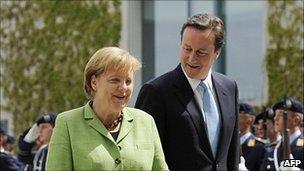Cameron vows to fight 'unacceptable' EU budget rise
- Published

Germany wants more powers for the EU while the UK wants it to spend less
Prime Minister David Cameron has vowed to fight what he has described as a "completely unacceptable" rise in the European Union's (EU) budget.
He told MPs the proposed 5.9% rise was "wrong" in the tough financial climate.
On the eve of an EU summit in Brussels, pressure is growing on the PM to resist calls for the EU to enshrine powers to stop a repeat of the Greek debt crisis.
Mr Cameron said any such move would only apply to countries using the euro and the UK would be exempt.
The government has pledged to hold a referendum on any future European treaty which would transfer powers from the UK to Brussels.
But in the wake of Greece's troubles and continued fears of financial instability in Europe, Germany is leading calls for temporary financial powers arising from the crisis to become permanent in treaty form.
It wants to amend the 2009 Lisbon Treaty to tighten the rules on EU nations' borrowing and to impose tougher budget discipline in future.
This would bring in sanctions for countries overshooting the maximum debt level allowed under the EU's Stability and Growth Pact (SGP) - 60% of gross domestic product.
'Carve out'
Many Conservative MPs are concerned any changes to the Lisbon Treaty - which became law last December after years of wrangling - could lead to a further erosion of British sovereignty and must be subject to public approval.
Asked about the issue at prime minister's questions, Mr Cameron acknowledged there were calls for a "new treaty clause to put the eurozone on a stronger footing".
But he stressed: "Clearly from our point of view we are not in the euro, we are not planning to join the euro and so any treaty change would not apply to us - just as the new rules in terms of the stability and funding mechanism, we have always had a carve out from them."
Mr Cameron said the UK's "priority" was dealing with the EU's annual budget - which is set to rise by 6% next year after the European Parliament rejected calls from the European Council for a lower increase.
"I think it is completely unacceptable at a time when we are making tough budget decisions here, we are seeing spending rise consistently in the European Union," he said.
"I think that this is wrong and I am going to be doing everything I can to try and sort out the budget for next year and then also look at the future financing of the European Union where we want to see strict controls."
Question of sovereignty
The 麻豆官网首页入口's Political Editor Nick Robinson said the PM was being pulled two ways over Europe - by the desire of Germany and other countries to further strengthen EU institutions and by many in his own party who want the UK to reclaim powers and reduce what it pays to the EU.
More than 35 Tory MPs defied the government earlier this month in a Commons vote by urging the UK to cut its budget contributions.
When EU leaders gather on Thursday, Mr Cameron was likely to advise them to find ways to bolster the eurozone without a treaty change or insist any new treaty does not give the EU fresh powers over British policy, our political editor added.
Conservative MP Bill Cash, a longstanding eurosceptic, later called for an emergency debate on the implications for any future change in the UK's legal status vis a vis the EU.
"That treaty will affect the UK and the control over our sovereign Parliament in respect of its control over the fiscal tax and economic governance of the UK, including the question of the rebate," he told MPs.
"Will the government veto this treaty? And will it guarantee that, if not, in accordance with the wishes of the voters of the UK, we have a referendum on this issue?"
For Labour, shadow Treasury minister Chris Leslie said the government's position on the issue was "far from clear" and he urged ministers to focus on the economic recovery rather than engage in "further rounds of navel gazing on European governance".
- Published27 October 2010
- Published18 October 2010